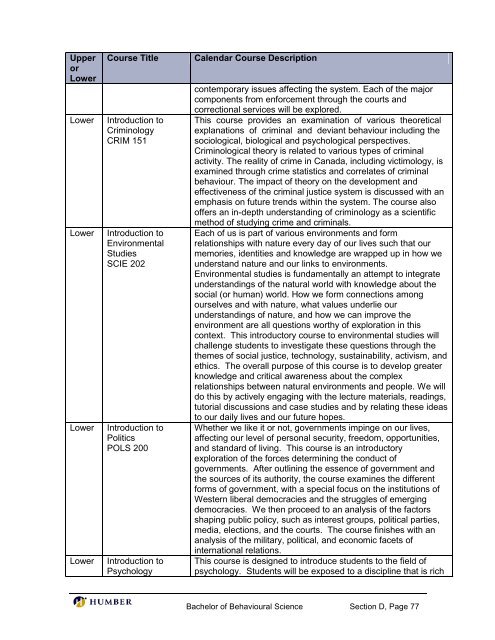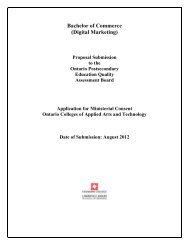Bachelor of Behavioural Science - Postsecondary Education Quality ...
Bachelor of Behavioural Science - Postsecondary Education Quality ...
Bachelor of Behavioural Science - Postsecondary Education Quality ...
Create successful ePaper yourself
Turn your PDF publications into a flip-book with our unique Google optimized e-Paper software.
Upper<br />
or<br />
Lower<br />
Lower<br />
Lower<br />
Lower<br />
Lower<br />
Course Title<br />
Introduction to<br />
Criminology<br />
CRIM 151<br />
Introduction to<br />
Environmental<br />
Studies<br />
SCIE 202<br />
Introduction to<br />
Politics<br />
POLS 200<br />
Introduction to<br />
Psychology<br />
Calendar Course Description<br />
contemporary issues affecting the system. Each <strong>of</strong> the major<br />
components from enforcement through the courts and<br />
correctional services will be explored.<br />
This course provides an examination <strong>of</strong> various theoretical<br />
explanations <strong>of</strong> criminal and deviant behaviour including the<br />
sociological, biological and psychological perspectives.<br />
Criminological theory is related to various types <strong>of</strong> criminal<br />
activity. The reality <strong>of</strong> crime in Canada, including victimology, is<br />
examined through crime statistics and correlates <strong>of</strong> criminal<br />
behaviour. The impact <strong>of</strong> theory on the development and<br />
effectiveness <strong>of</strong> the criminal justice system is discussed with an<br />
emphasis on future trends within the system. The course also<br />
<strong>of</strong>fers an in-depth understanding <strong>of</strong> criminology as a scientific<br />
method <strong>of</strong> studying crime and criminals.<br />
Each <strong>of</strong> us is part <strong>of</strong> various environments and form<br />
relationships with nature every day <strong>of</strong> our lives such that our<br />
memories, identities and knowledge are wrapped up in how we<br />
understand nature and our links to environments.<br />
Environmental studies is fundamentally an attempt to integrate<br />
understandings <strong>of</strong> the natural world with knowledge about the<br />
social (or human) world. How we form connections among<br />
ourselves and with nature, what values underlie our<br />
understandings <strong>of</strong> nature, and how we can improve the<br />
environment are all questions worthy <strong>of</strong> exploration in this<br />
context. This introductory course to environmental studies will<br />
challenge students to investigate these questions through the<br />
themes <strong>of</strong> social justice, technology, sustainability, activism, and<br />
ethics. The overall purpose <strong>of</strong> this course is to develop greater<br />
knowledge and critical awareness about the complex<br />
relationships between natural environments and people. We will<br />
do this by actively engaging with the lecture materials, readings,<br />
tutorial discussions and case studies and by relating these ideas<br />
to our daily lives and our future hopes.<br />
Whether we like it or not, governments impinge on our lives,<br />
affecting our level <strong>of</strong> personal security, freedom, opportunities,<br />
and standard <strong>of</strong> living. This course is an introductory<br />
exploration <strong>of</strong> the forces determining the conduct <strong>of</strong><br />
governments. After outlining the essence <strong>of</strong> government and<br />
the sources <strong>of</strong> its authority, the course examines the different<br />
forms <strong>of</strong> government, with a special focus on the institutions <strong>of</strong><br />
Western liberal democracies and the struggles <strong>of</strong> emerging<br />
democracies. We then proceed to an analysis <strong>of</strong> the factors<br />
shaping public policy, such as interest groups, political parties,<br />
media, elections, and the courts. The course finishes with an<br />
analysis <strong>of</strong> the military, political, and economic facets <strong>of</strong><br />
international relations.<br />
This course is designed to introduce students to the field <strong>of</strong><br />
psychology. Students will be exposed to a discipline that is rich<br />
<strong>Bachelor</strong> <strong>of</strong> <strong>Behavioural</strong> <strong>Science</strong> Section D, Page 77
















